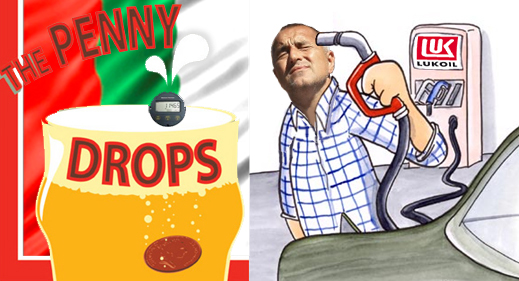
By John Helmer, Moscow
Faced with a Bulgarian government-ordered shutdown of its Burgas oil refinery, LUKoil, the Russian oil producer and exporter, began emergency negotiations with Bulgarian officials this morning, a LUKoil source told Fairplay. Bulgarian opposition politicians say the negotiations are being staged by Bulgaria’s Prime Minister Boyko Borisov (image right) to protect his party and himself from voter wrath, as petrol prices continue upwards and the Bulgarian presidential election approaches its due date on October 23.
The Bulgarian Customs agency triggered today’s negotiations by revoking the Burgas refinery’s license to sell and buy crude oil products. The published reason is that LUKoil did not instal the meters required by the Customs to measure the crude and product flows to and from the refinery, and verify the product taxes it should collect.
LUKoil, the second largest of Russia’s oil exporters, ships crude oil to Burgas from Russia’s Black Sea ports. The refinery, which processed more than 120,000 barrels of crude per day last year, has the capacity to process 200,000 bpd.
A report this morning by Uralsib Bank claims — and LUKoil sources confirm — that with a 40% share of Bulgarian petroleum market, LUKol is in conflict with the Bulgarian government over alleged abuse of market dominance and over-charging Bulgarian consumers for gasoline and other oil products. The refinery and LUKoil’s associated petroleum distribution network account for an estimated 9% of Bulgaria’s economy-wide gross domestic product, paying between 20% and 25% of the country’s taxes.
LUKoil spokesman Dmitry Dolgov told Fairplay: “the stakes are high. Oleg Durov, head of the main department of oil refining and petrochemistry of LUKoil, is now in Bulgaria negotiating the future of LUKoil’s participation in the country’s economy. The results of the negotiations are not clear yet.”
Uralsib Bank analyst Alexei Kokin, reported to clients today: “LUKOIL may have to make price concessions to Bulgarian customers and possibly reduce exports from Bulgaria. We do not foresee a major impact on the company’s 2011 results, as Bulgaria accounts for less than 5% of product sales by volume.” He recommended buying LUKoil shares, and at the start of today’s trading, the share price rocketed upwards on the bad news:

Officials at the Bulgarian Embassy decline to clarify the issues in dispute. In Sofia, the opposition Bulgarian Socialist Party (BSP) called the Burgas licence revocation a theatrical stunt. The BSP leader and former prime minister, Sergey Stanishev, said he was giving high marks to the acting skills of Prime Minister, Boyko Borisov, in what he called a well-rehearsed drama performance between the latter and the Lukoil chief executive in Bulgaria, Valentin Zlatev, when according to Stanishev, it is known the two are close friends. Bulgarian reports of Stanishev’s remarks record him as saying the revocation had been timed ahead of a planned shutdown of the refinery for scheduled renovation, and that stocks of fuel had been produced already for supplying the market at a higher price.
According to Stanishev, the measures of the Customs agency were appropriate but the timing doubtful. “This is pure theatre,” he said, “and it would go away after two days of ‘heavy’ negotiations between LUKoil and the cabinet with the end result being a fuel price hike,” the BSP leader predicted.
A spokesman for Borisov’s Citizens for European Development of Bulgaria (GERB), the ruling party in parliament, has announced that the government isn’t making a fight against the country’s fuel cartel, but enforcing the law for all companies to show that “big and small are equal.”











Leave a Reply